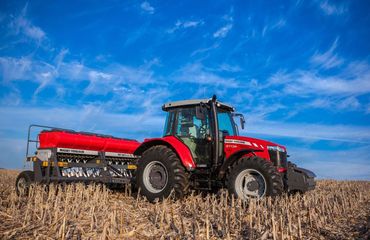São Paulo – The Brazilian Machinery and Equipment Industry Association (Abimaq) has been negotiating with the government the creation of a plan to encourage agricultural mechanization using Brazilian products in countries from the Middle East, Africa and Latin America. According to the association’s CEO, José Velloso, the idea is to create something similar to the program Mais Alimentos Internacional, but more comprehensive.
Initially named Mais Alimentos África, Mais Alimentos Internacional was a program that helped to export agricultural machinery to other countries. The government of each registered country, the majority in Africa and Latin America, would purchase the equipment and forward it, each in their own way, to small farmers. In addition to help fight hunger, it encouraged family farming.
Abimaq aims to go farther: “We want to export the integrated solution to countries with no established machinery industry. The agricultural machinery for the farmer, the road construction machinery to help build highways, machinery to help with logistics, food processing, packaging, for the plastic industry,” explained Velloso, in a press conference this Wednesday (31). “And also help in the development of customer services.”
According to Abimaq’s CEO, the plan has already been presented to the Brazilian Trade and Investment Promotion Agency (Apex-Brasil), to the Ministry of Foreign Relations (MRE), to the Ministry of Agriculture, Livestock and Supply (MAPA), to the Ministry of Industry, Foreign Trade and Services (MDIC) and to the Brazilian Development Bank (BNDES), and it got a positive reception in all of them.
“We are relying on all of the official bodies: Apex-Brasil to promote, the MRE to work with the embassies, the BNDES to fund,” he said. “Our plan involves twelve countries, from Latin America, the Middle East and Africa.”
According to Abimaq’s manager of foreign market, Patrícia Gomes, Saudi Arabia and the United Arab Emirates are two Arab countries expected to be targets of the program. However, a deadline for implementation has not yet been set, since the project is being negotiated with the government bodies.
2018 actions
In the last few years, Abimaq, in a partnership with Apex, has brought Arab buyers to important trade expos of the sector, such as Agrishow, in Ribeirão Preto (316 km from São Paulo), Feimec and Plástico Brasil. The initiative has generated positive results, according to Patrícia Gomes, who is searching for new buyers from the region for the events scheduled for this year: Feimec, in April, and Agrishow, in May.
“Our idea is to have Arab buyers in these events. We have been in contact with Apex-Brasil’s office in Dubai to see if we are able to bring them,” said Gomes. She also mentioned as positive the participation of Abimaq in Sima-Sipsa, in Algeria. “We welcomed many entrepreneurs interested in the Brazilian products. Not only in the agricultural machinery, but also from other sector,” she said.
Gomes said that the association is planning to take part in the Moroccan International Agriculture Fair (SIAM), in April, in Meknes. “We have a strong desire because Morocco is a market with great potential, but the dates kind of coincide with Agrishow, which affects a little the participation of the companies and even the attraction of buyers to come here,” explained the executive.
Results
Last year, Brazilian exports of machinery and equipment went up 16.6%, totaling USD 9.086 billion. In the same period, imports declined 17.2% to USD 12.77 billion, generating a trade deficit of 3.684 billion for the sector.
“The increase in exports was the only positive index last year,” said João Carlos Marchesan, Abimaq’s president. “The trend is to continue to go up this year, even with a lower profitability.”
The sector’s revenues declined 2.9% to BRL 67.1 billion (USD 21.65 billion) – it was the fifth consecutive year with a decline in revenues of the machinery and equipment sector. However, Marchesan expects it will be a different story in 2018: “We will grow 5% to 10% in revenues this year,” he predicts.
The results of the last six-month period shows a turnaround: in 2017 second half, according to Abimaq, revenues increased 0.5% in comparison to the same period of the previous year, and 5% over 2017’ first half. “We are getting back on track and we will begin to recover. It’s not growth, it’s a recovery,” said the president.
*Translated by Sérgio Kakitani




